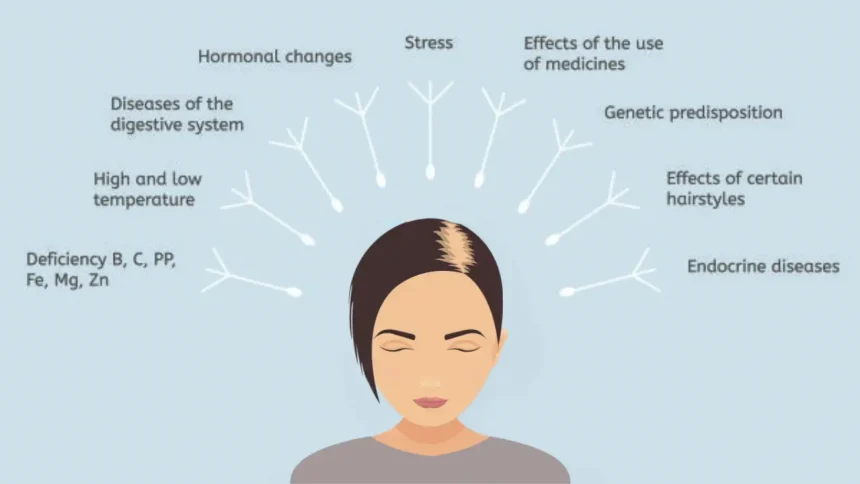Hair Loss
Hair loss can occur for various reasons, and it can affect both men and women. Here are some common causes:
Genetic Factors
Androgenetic Alopecia: Also known as male or female pattern baldness, this hereditary condition is the most common cause of hair loss.
Hormonal Changes
Conditions such as pregnancy, childbirth, menopause, and thyroid issues can lead to changes in hormone levels that affect hair growth.
Stress
Physical or emotional stress can trigger conditions like telogen effluvium, causing temporary hair loss.
Nutritional Deficiencies
Lack of essential nutrients like iron, protein, and vitamins (especially B vitamins and vitamin D) can contribute to hair loss.
Medical Conditions
Conditions such as alopecia areata (an autoimmune disorder), scalp infections, and certain chronic illnesses can lead to hair loss.
Medications
Some medications, including those for cancer, arthritis, depression, and heart conditions, can have hair loss as a side effect.
Hairstyles and Treatments
Traction alopecia can occur from tight hairstyles (like braids or ponytails) and excessive use of heat or chemical treatments.
Age
As people age, hair naturally thins and falls out as part of the normal aging process.
Environmental Factors
Pollution, UV exposure, and harsh hair products can also damage hair and contribute to hair loss.
Why does stress cause hair loss?

Telogen Effluvium:
Stress triggers a large number of hair follicles to enter the telogen (resting) phase prematurely. This results in increased shedding and noticeable hair loss, often occurring several months after the stressful event.
Hormonal Changes:
Stress increases the production of hormones like cortisol, which can affect hair growth cycles and contribute to hair loss.
Inflammation:
Stress can lead to increased inflammation in the body, which may impact hair follicles and disrupt normal hair growth.
Autoimmune Response:
In some cases, stress may trigger or exacerbate autoimmune conditions, such as alopecia areata, where the immune system mistakenly attacks hair follicles, leading to hair loss.
Behavioral Factors:
Stress can also lead to habits that contribute to hair loss, such as poor nutrition, lack of sleep, and unhealthy grooming practices (e.g., excessive styling or pulling on hair).
Causes Of Hair Loss

Heredity
Heredity is a key factor in hair loss, particularly in conditions like androgenetic alopecia, or pattern baldness. This type of hair loss can be inherited from either parent and is influenced by specific genes that affect hair follicle sensitivity to hormones like dihydrotestosterone (DHT). Family history is a strong indicator; if relatives experienced hair loss, there’s a higher likelihood you might as well. The age of onset and pattern of hair loss can vary widely based on genetic factors. Understanding your family history can help you anticipate and address potential hair loss.
Physical or Emotional Stress
Stress, whether physical or emotional, can lead to hair loss by disrupting the hair growth cycle. Physical factors like illness, surgery, or nutritional deficiencies, and emotional triggers such as anxiety or trauma, can cause conditions like telogen effluvium, where hair enters a resting phase and sheds excessively. Elevated stress hormones weaken hair follicles, but managing stress, maintaining a healthy diet, and proper hair care can help reverse the effects and promote regrowth over time.
Causes of this type of hair loss are:
- High fever or severe infection
- Childbirth
- Major surgery, major illness, sudden blood loss
- Severe emotional stress
- Crash diets, especially those that do not contain enough protein
- Drugs, including retinoids, birth control pills, beta-blockers, calcium channel blockers, certain antidepressants, NSAIDs (including ibuprofen)
Symptoms Of Hair Loss

Thinning Hair:
This often starts with a gradual reduction in hair density, usually noticeable on the crown or at the temples. In women, it may manifest as overall thinning, while men might see a receding hairline or bald spots.
Bald Spots:
These can appear as small, round patches of hair loss on the scalp or other areas, such as the beard or eyebrows. This is common in conditions like alopecia areata, an autoimmune disorder.
Excessive Shedding:
You might notice an increase in hair strands falling out when brushing, washing, or styling. Finding more hair than usual on your pillow or in the shower can be a sign of excessive shedding.
Receding Hairline:
In men, this is often characterized by a gradual retreat of the hairline from the forehead, creating an “M” shape. It can be a prominent feature of male pattern baldness.
Changes in Texture:
Hair may feel different before falling out—often becoming thinner, finer, or more brittle. This change can precede noticeable hair loss.
Itchy or Scaly Scalp:
Conditions like dermatitis or fungal infections may cause itchiness, flaking, or scaling on the scalp, which can contribute to hair loss.
Patches of Hair Loss:
In some cases, hair may fall out in small patches, leading to uneven areas of hair loss.


